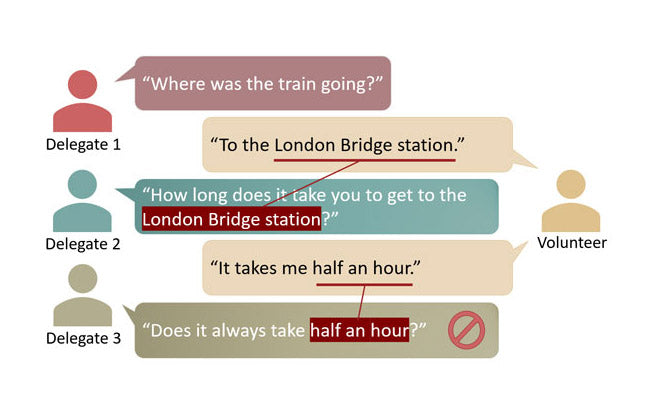Purpose
Most people are not good listeners. This is even more pronounced when people get excited about sharing their own views or thoughts and like to express them and share them with others quickly. The problem is that in their excitement they miss what has just been said. Over time this can develop into a bad habit leading to miscommunication and misunderstanding.
This exercise is designed to help delegates practice listening to others and avoid jumping in before they have shown that they have understood what is shared. After a few tries, participants will quickly learn to listen carefully and will significantly improve their communication skills by understanding other people’s positions and avoid repeating what has already been stated.
Objective
Every time you want to talk in a meeting, you must repeat what the previous person has just said before you can contribute.
Setup
- This exercise can be run in two ways:
- You can run it as a brainstorming exercise the next time you have a meeting in your organisation about work related subjects.
- You can set up an artificial group discussion in a training course specifically for this exercise so delegates can practice listening to each other before talking. In this case, you would need to provide a topic of discussion or ask the delegates to pick one themselves. It must be a topic that everyone can easily contribute to.
Round 1:
- Ask a volunteer to start the discussion by stating his own opinion about the chosen topic.
- Anyone who wants to express his opinion must now summarise what the previous person has just said before he can talk. For example, he can say, “As Mark just said…”
- Failure to recall and state what has been said means they miss their chance to talk and they have to wait until someone else has talked first.
- Originally people might be hesitant to join simply because they need to know what the previous person said and might have just missed it as they could have been thinking about what to contribute. Encourage everyone to participate until more people start to get the hang of it.
- As the conversations progress forward, monitor delegates to make sure that they don’t forget to summarise and instead jump in to express their views.
- Continue until everyone is comfortable with this style of discussion.
- Now move on to round two.
Round 2:
- Ask delegates to pick another topic.
- As before they must first summarise the previous person’s views before providing their own inputs. However, in this round if anyone makes a mistake and skips this summary, he is forced to drop out for the remainder of the discussions. He can no longer participate. Since now the punishment is much more sever, expect participants’ utmost attention and focus.
- Continue until you have only two people talking or if the topic has been exhausted.
- Follow with a discussion.
Timing
Explaining the Exercise: 2 minutes
Activity: 1 min choose topic + 10 min round 1 + 1 min choose topic + 10 min round 2 = 22 minutes
Group Feedback: 10 minutes
Discussion
How easy was it to summarise the pervious person’s views? Was it is easy to make mistakes and talk about your own views first? Did summarising affect your own thinking? Did you get better at this multi-tasking activity of listening to others while thinking at the same time? What did you think of the quality of the conversations in the second round? What do you think of applying this technique to real-world meetings?
Comments
By padma @ Saturday, March 8, 2014 12:35 AM
It's really great!! All the activities are very useful. Thanks a lot. It's a great service you are doing. Please continue.
Soft Skills Training Materials
Get downloadable training materials
Online Train the Trainer Course:
Core Skills
Learn How to Become the Best Trainer in Your Field
All Tags
Training Resources for You

Course Design Strategy
Available as paperback and ebook

Free Training Resources
Download a free comprehensive training package including training guidelines, soft skills training activities, assessment forms and useful training resources that you can use to enhance your courses.

Our Comprehensive Guide to Body Language

Train the Trainer Resources
Get Insights - Read Guides and Books - Attend Courses
Training Materials
Get downloadable training materials on: Management Training, Personal Development, Interpersonal Development, Human Resources, and Sales & Marketing














Leave a comment
All comments are moderated before being published.
This site is protected by hCaptcha and the hCaptcha Privacy Policy and Terms of Service apply.